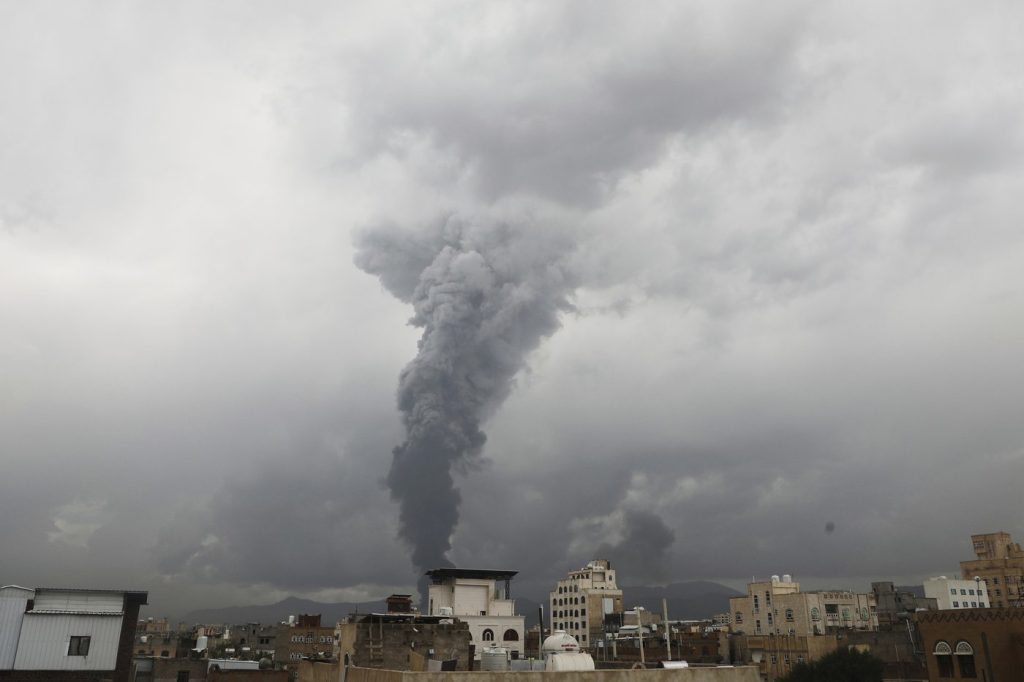CAIRO (AP) — Israeli airstrikes targeted Yemen's capital, Sanaa, on Sunday, following a missile attack from Houthi rebels towards Israel. The missile, which was described by the Israeli military as the first cluster bomb fired at it since 2023, marked a significant escalation in the ongoing conflict. The Iranian-backed Houthis reported multiple strike locations across Sanaa, including facilities deemed strategically important for military operations.
According to the Houthi-run health ministry, the airstrikes resulted in at least two fatalities and 35 injuries. Al-Masirah, the rebels' satellite television network, broadcasted news of a strike on an oil company, with social media platforms showcasing a fireball erupting from the scene. Residents in Sanaa experienced loud explosions near a closed military academy and the presidential palace, with visible smoke rising from Sabeen Square, a central hub in the city.
Hussein Mohamed, a local resident near the presidential palace, described the sounds of the explosions as overwhelmingly powerful. Another resident, Ahmed al-Mekhlafy, recounted the impact, noting that his house was shaken and windows shattered as a result of the blasts. The Israeli military confirmed that they targeted the Asar and Hizaz power plants, labeling them as crucial electricity supply facilities for military operations, alongside a military site housing the presidential palace.
For over 22 months, the Houthis have conducted missile and drone attacks towards Israel and targeted maritime vessels in the Red Sea, justifying their military actions as solidarity with the Palestinian people amidst the escalating conflict in Gaza. Nasruddin Amer, the deputy head of the Houthi media office, asserted that the latest airstrikes would not hinder their military operations and vowed to continue attacks on Israel until what they refer to as aggression ceases and the blockade is lifted.
These airstrikes were the first of their kind to hit Yemen since an earlier Israeli operation targeting energy infrastructure used by the Houthis. The recent Israeli strikes came after the Houthis launched their own newly equipped missile towards Israel, with a claim that it targeted Ben Gurion Airport, the country's largest airport. Israel reported that the missile disintegrated mid-air following several interception attempts.
An anonymous Israeli Air Force official characterized the missile launched on Friday as a new threat, emphasizing that it was a cluster munition designed to release multiple explosives upon impact. The official mentioned that this type of munition complicates interception, indicating that additional technological support from Iran has been provided to the Houthis. The operation involved more than ten Israeli fighter jets executing the airstrikes.
Houthi missile attacks over the past two years have dramatically disrupted shipping traffic in the Red Sea, which is crucial for global trade, with about $1 trillion of goods passing through annually. From November 2023 to December 2024, the Houthis reportedly targeted over 100 ships. Following a brief ceasefire in Gaza, they became the subject of a long-duration airstrike campaign launched by U.S. President Donald Trump.
In May, the U.S. announced a deal with the Houthis aiming to end airstrikes in exchange for halting assaults on shipping. However, the rebels insisted that this agreement did not cover activities against entities they perceive as aligned with Israel. In another notable turn, Israeli airstrikes struck Sanaa airport in May during a rare daytime operation, destroying the terminal and damaging multiple passenger planes belonging to Yemenia Airways.











